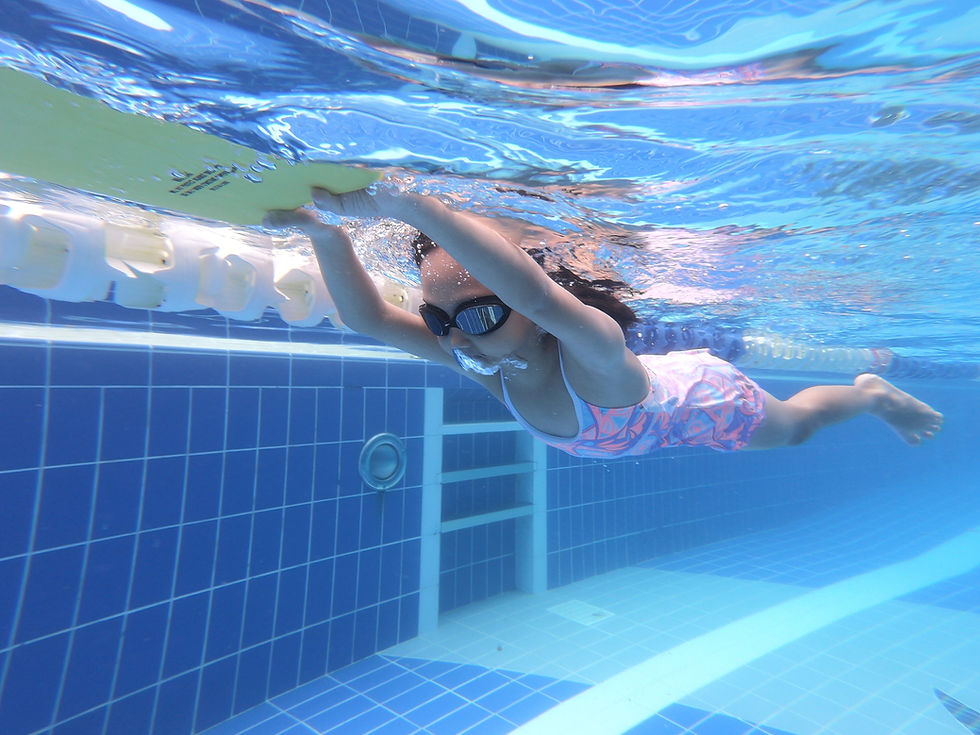Why Kickboard Drills Are Essential for Breaststroke Beginners
- SG Sink Or Swim

- Oct 2, 2025
- 4 min read

Building the Foundation of Power, Timing, and Confidence — One Kick at a Time
For beginners learning breaststroke, the stroke can feel like a confusing puzzle: arms pull, head lifts, legs kick, body glides — all in perfect sequence. But without a strong, efficient kick, the entire stroke collapses. That’s where kickboard drills become not just helpful — they’re essential.
While advanced swimmers may minimize kickboard use to preserve shoulder health, for breaststroke beginners, the kickboard is a powerful teaching tool that isolates the most critical component of the stroke: the whip-like, propulsive breaststroke kick.
In this article, we’ll explore why kickboard drills are non-negotiable for new breaststrokers, how they build foundational skills, and the best drills to accelerate learning — safely and joyfully.
🐸 Why the Breaststroke Kick Is Everything
Unlike freestyle or backstroke, where the kick provides stability and rhythm, the breaststroke kick generates up to 80% of forward propulsion. A weak, wide, or mistimed kick doesn’t just slow you down — it creates drag, sinks your hips, and disrupts your entire stroke cycle.
For beginners, mastering the kick first — before adding arms and breathing — is the smartest path to success.
“If your breaststroke kick isn’t working, nothing else will.”— Coach Dave Salo, USC Trojan Swim
✅ 5 Reasons Kickboard Drills Are Essential for Beginners
1. Isolates the Kick — No Distractions
With arms supported on a kickboard, beginners can focus 100% on leg mechanics:
Heel recovery (heels to butt, not knees out)
Whip motion (toes pointed outward, snap together)
Timing and rhythm
Without arm fatigue or breath stress, the nervous system learns the movement pattern faster.
2. Builds Propulsive Power
The breaststroke kick is explosive — not continuous. Kickboard drills allow beginners to:
Practice full-power snaps
Feel water pressure on the instep and inner calves
Develop adductor (inner thigh) and glute strength
💡 Tip: Use a slightly buoyant kickboard held at arm’s length to keep hips high and mimic race body position.
3. Teaches Proper Body Position
Many beginners sink at the hips during breaststroke. The kickboard:
Lifts the upper body, forcing hips to the surface
Creates a horizontal “race-ready” alignment
Helps swimmers feel what streamline should feel like
🎯 Cue: “Press your chest down slightly — let your hips rise like a seesaw.”
4. Develops Breath-Kick Coordination
Once the kick is solid, beginners add breathing:
Lift head to inhale during the kick’s power phase
Exhale steadily underwater during recovery
Submerge before arms recover
Kickboard drills with breath practice build this timing safely — without the complexity of arm pulls.
5. Builds Confidence and Reduces Fear
For nervous beginners, the kickboard provides:
Physical security (something to hold onto)
Controlled progression (start with 10m, build to 25m)
Immediate feedback (“Did I move forward?”)
Success with the kickboard = belief that “I can do this.”
🛠️ 4 Essential Kickboard Drills for Breaststroke Beginners
1. Basic Breast Kick with Kickboard
Hold kickboard at full arm extension, face in water
Perform slow, exaggerated kicks:
Recovery: Heels to butt, knees together
Power: Whip legs outward, then snap together
Focus on quiet entry and strong closure
🎯 Cue: “Kick like you’re snapping a towel — not opening a door.”
2. Breath Integration Drill
Same as above, but:
Lift head to breathe as legs snap together
Exhale slowly underwater during recovery
Keep kicks powerful and compact
💡 Start with 1 breath every 4 kicks, progress to every 2
3. Vertical Breast Kick (No Board)
In deep water, cross arms over chest
Perform breaststroke kick to keep chin above water
Builds raw power and eliminates board dependency
⚠️ Supervise closely — only for confident beginners
4. Glide + Kick Repetitions
Push off wall in streamline
Perform 1 powerful breaststroke kick
Glide to stop
Repeat 6–8 times
Teaches propulsion-to-glide ratio
🎯 Cue: “Kick once. Glide far. Rest easy.”
⚠️ Common Mistakes — And How to Fix Them
Knees wide during recovery | Creates drag, slows kick, illegal in competition | Cue: “Heels to butt — not knees out” |
Feet flexed (not pointed) | Reduces propulsion, strains ankles | Practice “toes out” on deck first |
Kicking downward | Pushes body up, not forward | Cue: “Kick backward — like pushing a ball behind you” |
Holding breath | Causes panic, poor timing | Add steady bubble exhale underwater |
📅 Sample Beginner Kickboard Session (20 Minutes)
Warm-Up:
100m easy freestyle or backstroke
4 x 25m flutter kick with board
Kick Focus:
6 x 25m Basic Breast Kick (rest 30s)
4 x 25m Breath Integration (rest 45s)
4 x 15m Glide + Kick Reps (rest 30s)
Confidence Builder:
“Treasure Hunt”: Kick to retrieve sinkable toys in shallow water
“Kick Race”: Who can glide farthest after one kick?
Cool-Down:
100m backstroke + big smile!
💬 Coaching Cues That Stick
🐸 “Heels to butt — not knees to sky.”
💥 “Snap your legs together like closing a book.”
🧱 “Glide like a plank — not a banana.”
💧 “Kick backward — not down.”
🌬️ “Breathe on the snap — not before.”
Final Thoughts
For breaststroke beginners, the kickboard isn’t a crutch — it’s a launchpad. It transforms a complex, intimidating stroke into a series of manageable, joyful steps. It builds power where it matters most. It creates confidence through immediate success.
So don’t skip the kickboard. Embrace it.Let every kick be a lesson.Let every glide be a victory.
Because the swimmer who masters the breaststroke kick……has already won half the race.
Heels in. Toes out. Snap tight. Glide far.
In breaststroke, speed begins at the feet — and the kickboard shows you how. 🐸💙





Comments